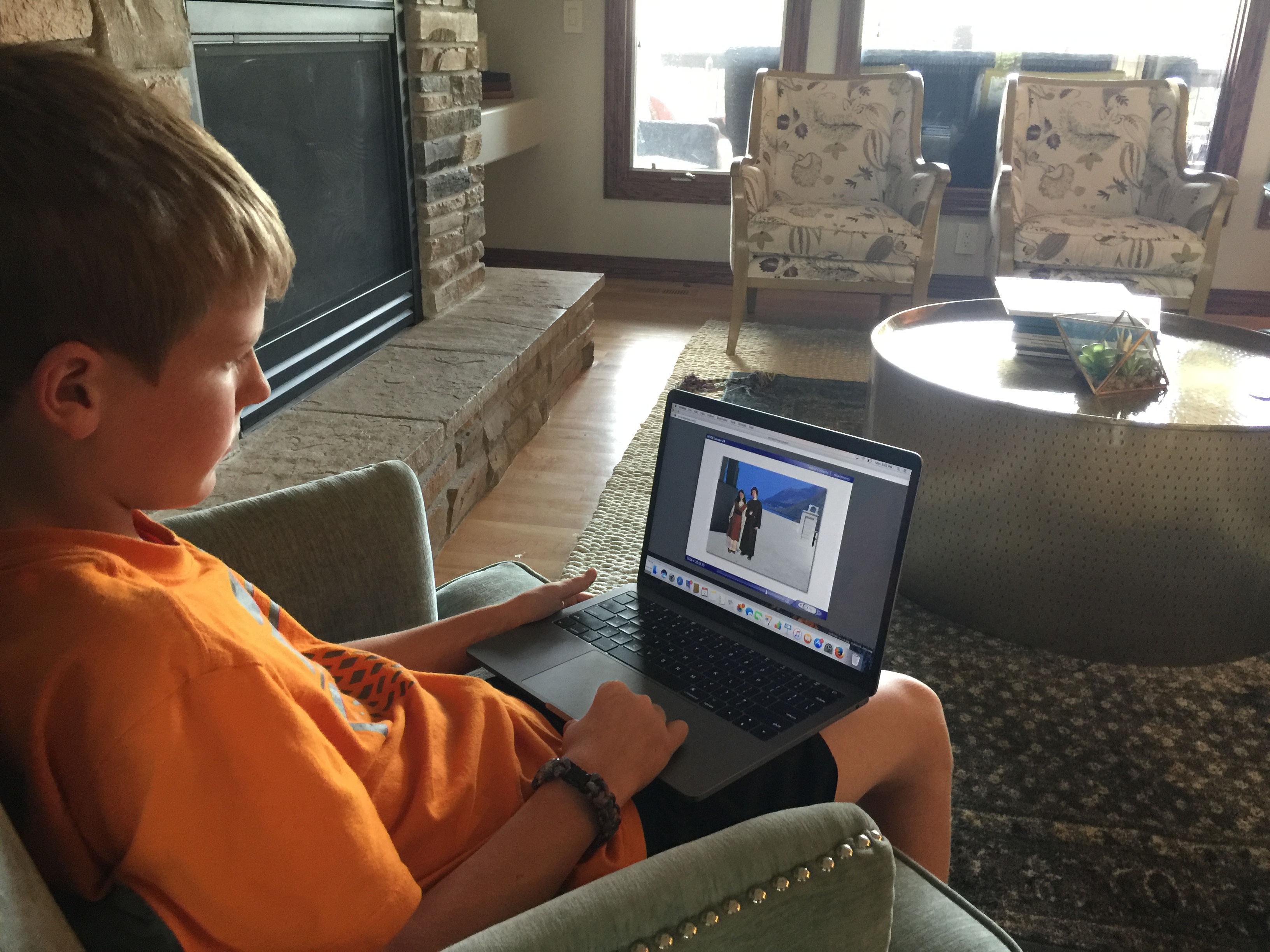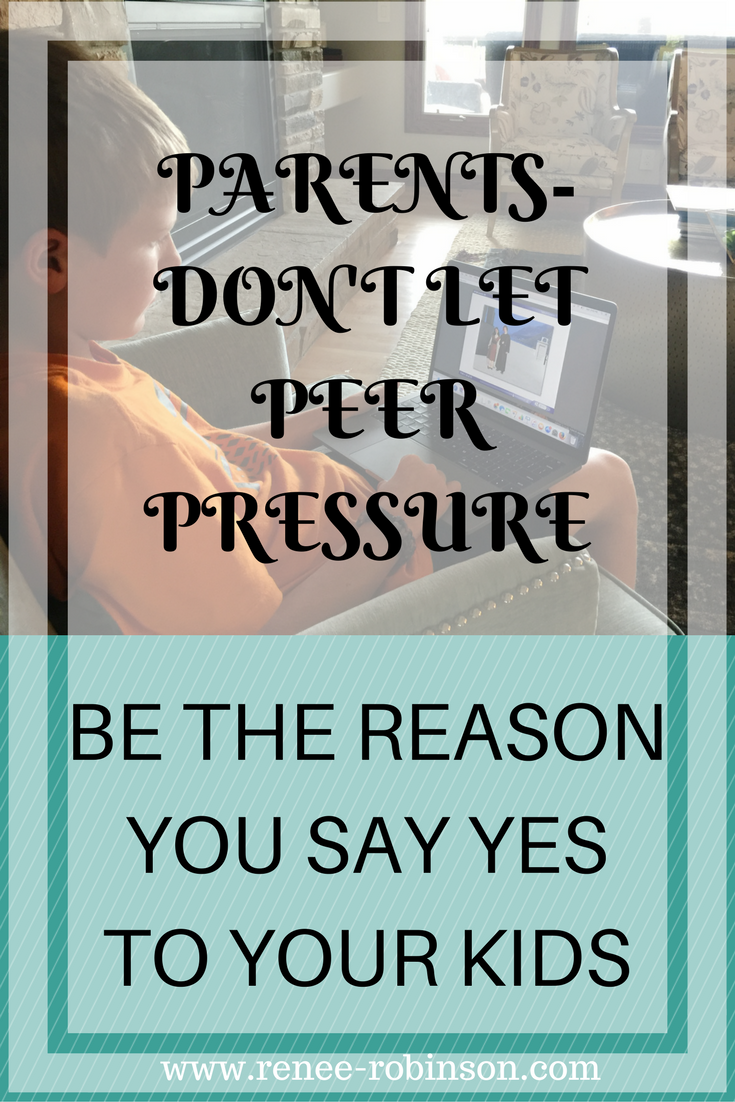Parents-Don’t Let Peer Pressure Be The Reason You Say Yes To Your Child


For those who prefer audio, you can listen to the podcast of this post by clicking this link.
He burst through the back door out of breath. “Mom! Dad! Can I walk up to Walgreens? Please they are all waiting for me at the front door.”
We looked out the door and confirmed several kids, none of whom we knew at all, waited to walk along a major road full of traffic with no sidewalks the 1/2 mile to Walgreens.
Our response went something like this. “Um. No way.”
“You can’t say no. They are all waiting on me. All their parents let them. Y’all are overprotective. It’s not fair.”
He continued to tell us how embarrassed he would be to have to say his parents wouldn’t allow him to go. We told him we were sorry but for several reasons, he could not accompany these kids. We offered to drive them there but that was shut down immediately.
After he let down these friends we didn’t know yet, we explained that as his parents, we would never make a decision based on peer pressure or his pressure placed on us. We would never agree to let him do something simply because all the other parents let their kids. And we would never give way to his tactics of pressure by having his friends here waiting in hopes that we would fear letting any of them down or embarrassing our own child.
“We don’t make our decisions based on peer pressure, or fear of missing out, or fear of what others think.”
We continued explaining that we didn’t know these kids. What if they shoplifted and he was with them? He would be in the same trouble they were in. We explained it wasn’t out of fear, but out of protection, that we couldn’t let him go.
Until our children are more mature and able to make wiser decisions, we are responsible for showing them how to make these decisions.
Later that night he came back to us and said he completely understood. Initially, he was mad but after really thinking through it, he realized he didn’t really want to go to Walgreens. He simply wanted to be accepted.
Isn’t that what all tweens/teens want? To be accepted? If we are totally honest, isn’t that what we as parents want as well?
Peer pressure doesn’t end after graduation. It’s something we continue to walk through. As our children walk these roads, we walk with them. We find ourselves facing the pressure of allowing our children to do things so they won’t be left out or looked at as weird.
As parents we have an enormous calling to point them to the cross over and over and over again.
Our children are already accepted by the One who gave His life for them. And that is the only acceptance that truly matters.
If you are a parent, there is no doubt in my mind you have heard from the lips of your kids, “But that’s not fair, all my friends get to….”
And you might answer something like this, “Well, I’m not everyone else’s parent.” Or maybe you say something a little deeper and wiser. No matter we’ve all listened as our kids tried to persuade us to allow them to go along with what everyone else is doing.
I remember many times growing up asking to do something my mom refused to budge on. I was mad at her during those times, but now I’m grateful for her protection.
I find myself tempted to fall into the same trap my children fall into. I find myself worried about my kids not fitting in or feeling different or left out.
The area I see this most prevalent in is the world of the smartphone in the hands of kids, tweens, and young teens. By allowing our kids to enter into the world of texting, chatting, surfing, and social media, we are allowing them to walk into potentially dangerous situations that appear harmless and fun.
Just because all our kids’ friends have smartphones and social media accounts doesn’t mean we have to allow it in our kids’ lives. Yet this is the number one response I hear from parents who don’t want to allow their kid to have a smartphone.
I don’t believe that we recognize it is peer pressure causing us to say yes to our kids when our instincts are screaming, “No! Not yet. Just wait a little longer.”
What is happening to the souls of these children living in a highly connected, yet truly disconnected, picture-perfect driven world?
If I want my kids not to worry what others think, I need to set that example in my parenting.
If I want my kids to protect what they consume with their eyes, I have to place protective boundaries around their eyes in the training years.
If I want to protect their heart from destruction through bullying, I can’t place them in the arena where kids feel emboldened to speak freely because they speak from behind a screen.
Our kids, in their impressionable years, don’t know who they are yet. They are figuring out life, and life is hard even when it’s easy. Our kids need 100 times the reassurance in the tween years.
We are bombarded with new studies and statistics showing alarming rates of tween and teen suicide, pornography addictions in our children, runaways and abductions from online relationships, and bullying like we’ve never experienced before.
I have to ask, what good comes from our children relating in the online world? How does this enhance their lives, make them more well-rounded, make them wiser?
When we look at the statistics and studies are our teens better off since the introduction of the smartphone?
Once we open the smartphone door, it’s hard to close it. Once our kids get a taste of approval and acceptance and adoration online, their appetites grow. We know this is true because we see it in our own lives and kids need much more than we do.
Kids begin feeding on the likes, forming opinions of themselves based on what others say about them, valuing themselves based on how many shares they received.
Our boys attended a youth retreat last summer where the theme was A1. Audience of One. I would love for their lives to truly be lived for an audience of one. But when we place a smartphone in their hand, we are effectively handing them an audience of the world.
It’s better to say no, to protect our kids a little longer than they want to be protected. They don’t know what dangers lurk online. Our job is to protect, not just their physical lives, but their emotional, mental, and spiritual lives as well.
Times have changed. It’s ok to be overprotective when we are protecting their hearts, minds, souls, and lives.
We are still the parent. We can still say no. Our no is not a no forever, it’s a no for right now until they really know who they are. For each child this age will look different.
In our home we don’t have a set age because each child differs in maturity and wisdom. We are able to know which kids can handle a smartphone at what age.
At some point in the teen years, a smartphone will happen. As parents we still shoulder the responsibility of deciding when the right time arrives. I don’t think we will regret waiting longer than what seems to be the norm.


